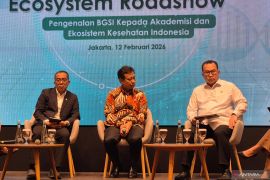In the State of the Global Islamic Economy (SGIE) Report in 2022, Indonesia has ranked second in the world as a user of halal products, he noted.
However, Indonesia’s halal product exports account for only 3.8 percent of the world's halal market.
"This inequality requires technology and innovation encouragement to make it easier for business actors to produce competitive local halal products," Hendrian said in a statement received by ANTARA in Jakarta on Monday.
Public awareness of halal products has continued to grow globally with the products even becoming a lifestyle choice, he said adding, Indonesia has been no exception as the country with the largest Muslim population in the world.
"The high demand for halal products encouraged the development of the halal industry, which later developed into a new perspective in business development," Hendrian said.
Therefore, BRIN has produced various research and innovation results to support the halal industry, especially in applied research that can be utilized by business actors and the public, for example, food packaging methods, halal detection tools for several types of foods, and alcohol detection tools.
Related news: Over 731,000 products certified halal since 2019: BPJPH
BRIN has also invited technology producers to collaborate with business actors for developing the national halal industry sector.
Head of the Food Technology and Process Research Center at BRIN, Satriyo Krido Wahono, said that halal research is still being carried out at BRIN with a number of focuses, such as material detection and innovation in the development of substitute materials.
"When the (material) is still raw, there has been detection research and there is the Indonesian National Standard (SNI). The gold standard analysis is already there. But when it has been processed, it has undergone structural changes, there are difficulties to detect. This is a concern to be developed further," he said.
The future target for halal research is to enable fast detection but zero tolerance for non-halal content, he added.
In addition, BRIN is focusing on research on the substitution of halal materials or imported materials.
According to Wahono, technological innovation is needed to replace imported materials, which are currently dominating the market with local products remaining unexplored, for instance, maritime products.
Related news: BRIN supports strengthening of halal product ecosystem, industry
Related news: Some 30 halal inspection institutions are ready to operate: Ministry
Translator: Martha H, Azis Kurmala
Editor: Suharto
Copyright © ANTARA 2022












